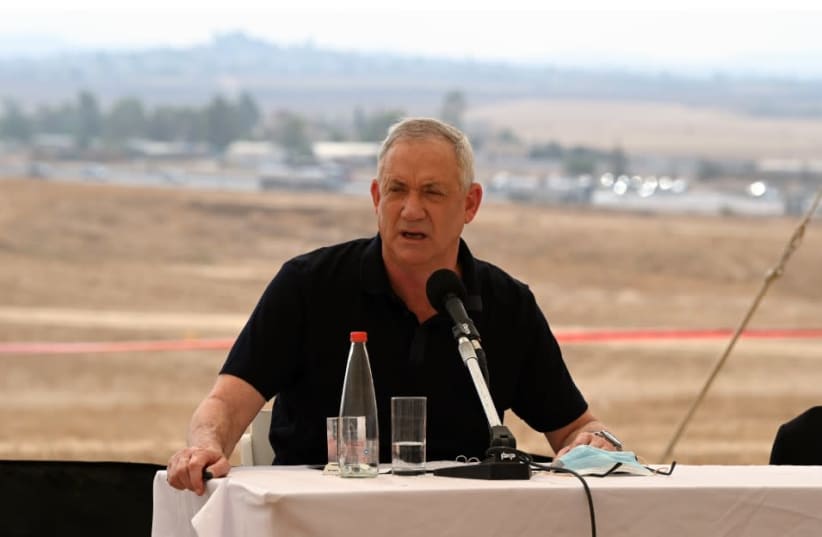Despite years of stalling the move of the IDF’s Intelligence Directorate to the Negev, Defense Minister Benny Gantz visited the Lakiya area on Monday and met with the heads of regional authorities.
“We are building a national project whose first goal is to strengthen Military Intelligence,” Gantz said, adding that the infrastructure that will be at its disposal and its capabilities will make it “a strong and leading corps.”
Gantz was joined by Maj.-Gen. (ret.) Amir Eshel, director-general of the Defense Ministry, Minister in the Defense Ministry Michael Biton and others. During the visit, head of the Defense Ministry’s “Move South” project Itzik Cohen presented the key aspect of the project, including the planned relocation of a large number of Military Intelligence units from bases in central Israel to the Negev.
The bases will be closed and turned into residential or commercial space.
The army’s move south, called “Project IDF Ascent to the Negev,” began in 2017 with the transfer of the City of Training Bases (Ir Habahadim) outside Beersheba, two hours south of Tel Aviv.
Ir Habahadim, which sits on an area of 106.5 hectares (263 acres) houses more than 10,000 soldiers and the IDF’s School of Technology and Maintenance, C4I (the army’s Command, Control, Computers, Communications and Information Branch), Logistics Training School, Military Police, Military Medicine, School of Education and Youth and School of Human Resources.
The army’s move to the Negev is seen as the military’s largest and most ambitious infrastructure project ever, which will provide an economic boom to the area and is expected to yield $6 billion per year. The move also means an upgrade to the area’s infrastructure, with an expected relocation of hundreds of families belonging to career soldiers to the South.
With the move, approximately 20,000 soldiers in the technology branch alone would serve in the South and thousands more from other corps. The Defense Ministry has admitted that almost half would have to commute from central Israel, which would require additional transportation infrastructure.
But the move to the Lakiya area, just north of Beersheba, has stalled, due to in part to IDF Chief of Staff Lt.-Gen .Aviv Kochavi’s requirement that a rail line directly to the area be constructed.
According to Gantz, the move to the Negev will provide Military Intelligence with “the best, highest quality technological facility” and that the military, including Kochavi and the rest of the defense establishment, see the Negev as the right location to further develop the IDF.
“The IDF – including the chief of staff and the chief of the Intelligence Directorate, whom I spoke with – myself, and the entire defense establishment, see the Negev as the proper place for us to expand to,” he said.
“In addition, we are helping to meet the national challenge of developing the south,” Gantz said, adding that the government is working to find a “suitable transportation solution” to support and promote the project.
Years after the project began, Biton said their visit to the area on Monday was to “begin to establish facts on the ground and bring the Military Intelligence’s flagship project back on track.”
As a Negev resident, Biton said he was one of the regional authorities that promoted the establishment of the bases in the region and is “committed to influencing the promotion of the last phase” of the IDF’s move to the South.
“Our mission is not over yet. In the coming months, we will be required to build a complementary mode of transportation and development solutions for all those who will come to settle in all the wonderful communities in the Negev,” he added.
